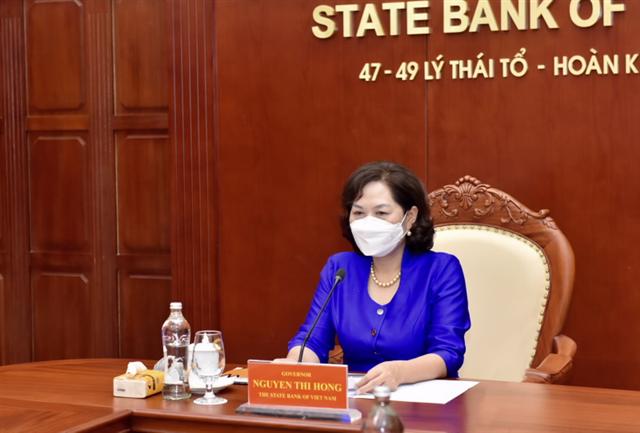US Treasury, Vietnam c.bank committed to keeping strong partnership
US Treasury, Vietnam c.bank committed to keeping strong partnership
Both sides are committed to maintaining close cooperation and look forward to addressing other shared challenges, such as supporting a strong and inclusive recovery from the Covid-19 pandemic.
The US Department of the Treasury (Treasury) and the State Bank of Vietnam (SBV), the country’s central bank, share the goals of maintaining the strength, stability, development, and resilience of each country’s economy and financial system.

SBV Governor Nguyen Thi Hong at the online meeting. Source: SBV
|
The view was made clear in a joint statement following the online meeting between US Secretary of the Treasury Janet L.Yellen and SBV’s Governor Nguyen Thi Hong on July 19.
Under the statement, both sides noted they have had constructive discussions in recent months through the enhanced engagement process and reached an agreement to address Treasury’s concerns about Vietnam’s currency practices as described in Treasury’s Report to Congress on the Macroeconomic and Foreign Exchange Policies of Major Trading Partners of the US.
In this regard, the SBV underscored that the focus of its monetary policy framework is to promote macroeconomic stability and control inflation.
Vietnam confirms that it is bound under the Articles of Agreement of the International Monetary Fund (IMF) to avoid manipulating its exchange rate in order to prevent effective balance of payments adjustment or to gain an unfair competitive advantage and will refrain from any competitive devaluation of the Vietnamese dong (VND).
The SBV said it is also making ongoing efforts to further modernize and make more transparent its monetary policy and exchange rate framework. In support of these efforts, the SBV will continue to improve exchange rate flexibility over time, allowing the VND to move in line with the stage of development of the financial and foreign exchange markets and with economic fundamentals while maintaining macroeconomic and financial market stability.
The SBV will continue to provide necessary information for Treasury to conduct a thorough analysis and reporting on the SBV’s activities in the foreign exchange market in the Treasury’s semiannual report to Congress on the Macroeconomic and Foreign Exchange Policies of Major Trading Partners of the US.
Meanwhile, the Treasury said it will inform other US government agencies that it has reached an agreement with the SBV to address Treasury’s concerns about Vietnam’s currency practices.
“I welcome the constructive dialogue between the te Treasury and the SBV on currency policy, and the mutual understanding we have reached,” said Secretary Yellen.
“I believe the SBV’s attention to these issues over time not only will address Treasury’s concerns, but also will support the further development of Vietnam’s financial markets and enhance its macroeconomic and financial resilience.”
Governor Hong also expressed her appreciation for the work done by the technical levels of both institutions towards a shared understanding of currency matters based on the principles of partnership and mutual respect.
“The SBV will continue to manage exchange rate policy within its general monetary policy framework to safeguard the proper functioning of the monetary and foreign exchange markets, to promote macroeconomic stability and to control inflation, not to create an unfair competitive advantage in international trade,” said Governor Hong.
Secretary Yellen and Governor Hong are committed to maintaining close cooperation between Treasury and the SBV, and look forward to addressing other shared challenges, such as supporting a strong and inclusive recovery from the Covid-19 pandemic.
|
On April 17, the Treasury dropped Vietnam, Switzerland, and Taiwan (China) from the list of currency manipulators, saying insufficient evidence to conclude that the three countries had manipulated their exchange rates for purposes of preventing effective balance of payments adjustments or gaining unfair competitive advantage in international trade. While removing a number of countries from the manipulation list, the US announced a Monitoring List of major trading partners that merit close attention to their currency practices and macroeconomic policies, comprising China, Japan, South Korea, Germany, Ireland, Italy, India, Malaysia, Singapore, Thailand, and Mexico. |
Ngoc Mai
























